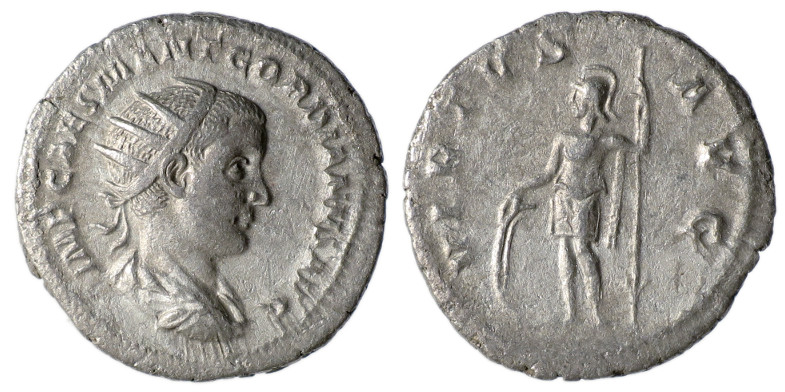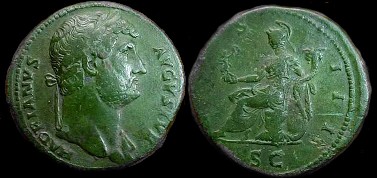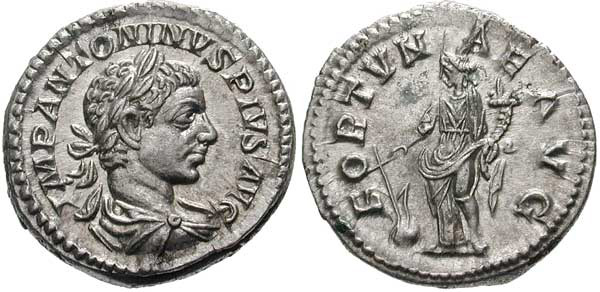|
Gordian II
Gordian II (; 192 – April 238) was briefly Roman emperor with his father Gordian I in 238, the Year of the Six Emperors. Seeking to overthrow Maximinus Thrax, he died in battle outside Carthage. Since he died before his father, Gordian II had the shortest recorded reign of any Roman emperor, at about 22 days. Early life Born 192, Gordian II was the only known son of Gordian I, who was said to be related to prominent senators. His praenomen and nomen ''Marcus Antonius'' suggest that his paternal ancestors received Roman citizenship under the triumvir Mark Antony, or one of his daughters, during the late Roman Republic. Gordian's cognomen "Gordianus" suggests that his family origins were from Anatolia, especially Galatia and Cappadocia. According to the notoriously unreliable ''Historia Augusta'', his mother was a Roman woman called Fabia Orestilla, born circa 165, who the ''Historia'' claims was a descendant of emperors Antoninus Pius and Marcus Aurelius through her father ... [...More Info...] [...Related Items...] OR: [Wikipedia] [Google] [Baidu] |
Gordian III
Gordian III (; 20 January 225 – February 244) was Roman emperor from 238 to 244. At the age of 13, he became the youngest sole emperor of the united Roman Empire. Gordian was the son of Maecia Faustina and her husband Junius Balbus, who died before 238. Their names are mentioned in the unreliable ''Historia Augusta''. Maecia was the daughter of Emperor Gordian I and sister of Emperor Gordian II. Very little is known of his early life before his acclamation. Rise to power In 235, following the murder of Emperor Alexander Severus in Moguntiacum (modern Mainz), the capital of the Roman province Germania Superior, Maximinus Thrax was acclaimed emperor. In the following years, there was a growing opposition against Maximinus in the Roman Senate and amongst the majority of the population of Rome. In 238, a rebellion broke out in the Africa Province, where Gordian's grandfather and uncle, Gordian I and II, were proclaimed joint emperors. This revolt was suppressed within a mon ... [...More Info...] [...Related Items...] OR: [Wikipedia] [Google] [Baidu] |
Sestertius
The ''sestertius'' (: ''sestertii'') or sesterce (: sesterces) was an Ancient Rome, ancient Roman Roman currency, coin. During the Roman Republic it was a small, silver coin issued only on rare occasions. During the Roman Empire it was a large brass coin. The name ''sestertius'' means "two and one half", referring to its nominal value of two and a half ''as (Roman coin), asses'' (a bronze Roman coin, singular ''as''), a value that was useful for commerce because it was one quarter of a denarius, a coin worth ten ''asses''. The name is derived from ''semis'', "half" and ''tertius'', "third", in which "third" refers to the third ''as'': the sestertius was worth two full ''asses'' and half of a third. English-language sources routinely use the original Latin form ''sestertius'', plural ''sestertii''; but older literature frequently uses ''sesterce'', plural ''sesterces'', ''terce'' being the English equivalent of ''tertius''. A modern shorthand for values in sestertii is IIS (Un ... [...More Info...] [...Related Items...] OR: [Wikipedia] [Google] [Baidu] |
Roman Republic
The Roman Republic ( ) was the era of Ancient Rome, classical Roman civilisation beginning with Overthrow of the Roman monarchy, the overthrow of the Roman Kingdom (traditionally dated to 509 BC) and ending in 27 BC with the establishment of the Roman Empire following the War of Actium. During this period, Rome's control expanded from the city's immediate surroundings to hegemony over the entire Mediterranean Sea, Mediterranean world. Roman society at the time was primarily a cultural mix of Latins (Italic tribe), Latin and Etruscan civilization, Etruscan societies, as well as of Sabine, Oscan, and Greek cultural elements, which is especially visible in the Ancient Roman religion and List of Roman deities, its pantheon. Its political organisation developed at around the same time as direct democracy in Ancient Greece, with collective and annual magistracies, overseen by Roman Senate, a senate. There were annual elections, but the republican system was an elective olig ... [...More Info...] [...Related Items...] OR: [Wikipedia] [Google] [Baidu] |
Consul
Consul (abbrev. ''cos.''; Latin plural ''consules'') was the title of one of the two chief magistrates of the Roman Republic, and subsequently also an important title under the Roman Empire. The title was used in other European city-states through antiquity and the Middle Ages, in particular in the Republics of Genoa and Pisa, then revived in modern states, notably in the First French Republic. The related adjective is consular, from the Latin '' consularis''. This usage contrasts with modern terminology, where a consul is a type of diplomat. Roman consul A consul held the highest elected political office of the Roman Republic (509 to 27 BC), and ancient Romans considered the consulship the highest level of the '' cursus honorum'' (an ascending sequence of public offices to which politicians aspired). Consuls were elected to office and held power for one year. There were always two consuls in power at any time. Other uses in antiquity Private sphere It was not uncommon ... [...More Info...] [...Related Items...] OR: [Wikipedia] [Google] [Baidu] |
Praetor
''Praetor'' ( , ), also ''pretor'', was the title granted by the government of ancient Rome to a man acting in one of two official capacities: (i) the commander of an army, and (ii) as an elected ''magistratus'' (magistrate), assigned to discharge various duties. The functions of the magistracy, the ''praetura'' (praetorship), are described by the adjective itself: the ''praetoria potestas'' (praetorian power), the ''praetorium imperium'' (praetorian authority), and the ''praetorium ius'' (praetorian law), the legal precedents established by the ''praetores'' (praetors). ''Praetorium'', as a substantive, denoted the location from which the praetor exercised his authority, either the headquarters of his ''castra'', the courthouse (tribunal) of his judiciary, or the city hall of his provincial governorship. The minimum age for holding the praetorship was 39 during the Roman Republic, but it was later changed to 30 in the early Empire. History of the title The status of the ''pra ... [...More Info...] [...Related Items...] OR: [Wikipedia] [Google] [Baidu] |
Elagabalus
Marcus Aurelius Antoninus (born Sextus Varius Avitus Bassianus, 204 – 13 March 222), better known by his posthumous nicknames Elagabalus ( ) and Heliogabalus ( ), was Roman emperor from 218 to 222, while he was still a teenager. His short reign was notorious for religious controversy and alleged sexual debauchery. A close relative to the Severan dynasty, he came from a prominent Syrian Arabs, Syrian Arab family in Emesa (Homs), Roman Syria, Syria, where he served as the head priest of the Solar deity, sun god Elagabalus (deity), Elagabal from a young age. After the death of his cousin, the emperor Caracalla, Elagabalus was raised to the principate at 14 years of age in an army revolt instigated by his grandmother Julia Maesa against Caracalla's short-lived successor, Macrinus. He only posthumously became known by the Latinised name of his god. Elagabalus is largely known from accounts by the contemporary senator Cassius Dio who was strongly hostile to him, Herodian, who lik ... [...More Info...] [...Related Items...] OR: [Wikipedia] [Google] [Baidu] |
Quaestor
A quaestor ( , ; ; "investigator") was a public official in ancient Rome. There were various types of quaestors, with the title used to describe greatly different offices at different times. In the Roman Republic, quaestors were elected officials who supervised the state treasury and conducted audits. When assigned to provincial governors, the duties were mainly administrative and logistical, but also could expand to encompass military leadership and command. It was the lowest ranking position in the ' (course of offices); by the first century BC, one had to have been quaestor to be eligible for any other posts. In the Roman Empire, the position initially remained as assistants to the magistrates with financial duties in the provinces, but over time, it faded away in the face of the expanding imperial bureaucracy. A position with a similar name (the ') emerged during the Constantinian period with judicial responsibilities. Etymology ''Quaestor'' derives from the Latin verb ... [...More Info...] [...Related Items...] OR: [Wikipedia] [Google] [Baidu] |
Maecia Faustina
Maecia Faustina is the name given by the unreliable ancient text ''Historia Augusta'' for the daughter of Roman emperor Gordian I, sister of Gordian II, and mother of Gordian III. However, some modern historians dismiss this name as false and have instead called her Antonia Gordiana. She was a prominent and wealthy woman who lived in the troubled and unstable 3rd century and through her son had a massive influence on Roman politics. Biography She was most probably born in Rome. Along with her elder brother, she was raised and spent her childhood in the house that Roman Republican general Pompey had built in Rome. Previous owners included Roman triumvir Mark Antony and Roman emperor Tiberius. After 214, Maecia married a Roman senator whose name is unknown. The ''Augustan History'' names her husband as Junius Balbus, however modern historians dismiss this name as being incorrect. She bore her husband a son on 20 January 225, the future emperor Marcus Antonius Gordianus Pius, or ... [...More Info...] [...Related Items...] OR: [Wikipedia] [Google] [Baidu] |
Herodes Atticus
Herodes Atticus (; AD 101–177) was an Athenian rhetorician, as well as a Roman senator. A great philanthropic magnate, he and his wife Appia Annia Regilla, for whose murder he was potentially responsible, commissioned many Athenian public works, several of which stand to the present day. He was one of the best-known figures of the Antonine Period, and taught rhetoric to the Roman emperors Marcus Aurelius and Lucius Verus, and was advanced to the consulship in 143. His full name as a Roman citizen was Lucius Vibullius Hipparchus Tiberius Claudius Atticus Herodes. According to Philostratus, Herodes Atticus, in possession of the best education that money could buy, was a notable proponent of the Second Sophistic. Having gone through the '' cursus honorum ''of civil posts, he demonstrated a talent for civil engineering, especially the design and construction of water-supply systems. The Nymphaeum at Olympia was one of his dearest projects. However, he never lost sight of p ... [...More Info...] [...Related Items...] OR: [Wikipedia] [Google] [Baidu] |
Marcus Aurelius
Marcus Aurelius Antoninus ( ; ; 26 April 121 – 17 March 180) was Roman emperor from 161 to 180 and a Stoicism, Stoic philosopher. He was a member of the Nerva–Antonine dynasty, the last of the rulers later known as the Five Good Emperors and the last emperor of the Pax Romana, an age of relative peace, calm, and stability for the Roman Empire lasting from 27 BC to 180 AD. He served as Roman consul in 140, 145, and 161. Marcus Aurelius was the son of the praetor Marcus Annius Verus (father of Marcus Aurelius), Marcus Annius Verus and his wife, Domitia Calvilla. He was related through marriage to the emperors Trajan and Hadrian. Marcus was three when his father died, and was raised by his mother and Marcus Annius Verus (II), paternal grandfather. After Hadrian's Adoption in ancient Rome, adoptive son, Aelius Caesar, died in 138, Hadrian adopted Marcus's uncle Antoninus Pius as his new heir. In turn, Antoninus adopted Marcus and Lucius Verus, Lucius, the son of Aelius. ... [...More Info...] [...Related Items...] OR: [Wikipedia] [Google] [Baidu] |
Antoninus Pius
Titus Aelius Hadrianus Antoninus Pius (; ; 19 September 86 – 7 March 161) was Roman emperor from AD 138 to 161. He was the fourth of the Five Good Emperors from the Nerva–Antonine dynasty. Born into a senatorial family, Antoninus held various offices during the reign of Emperor Hadrian. He married Hadrian's niece Faustina the Elder, Faustina, and Hadrian adopted him as his son and successor shortly before his death. Antoninus acquired the cognomen Pius after his accession to the throne, either because he compelled the Roman Senate, Senate to Roman imperial cult, deify his adoptive father, or because he had saved senators sentenced to death by Hadrian in his later years. His reign is notable for the peaceful state of the Empire, with no major revolts or military incursions during this time. A successful military campaign in Geography of Scotland, southern Scotland early in his reign resulted in the construction of the Antonine Wall. Antoninus was an effective administrator, ... [...More Info...] [...Related Items...] OR: [Wikipedia] [Google] [Baidu] |
Historia Augusta
The ''Historia Augusta'' (English: ''Augustan History'') is a late Roman collection of biographies, written in Latin, of the Roman emperors, their junior colleagues, Caesar (title), designated heirs and Roman usurper, usurpers from 117 to 284. Supposedly modeled on the similar work of Suetonius, ''The Twelve Caesars'', it presents itself as a compilation of works by six different authors, collectively known as the ''Scriptores Historiae Augustae'', written during the reigns of Diocletian and Constantine I and addressed to those emperors or other important personages in Ancient Rome. The collection, as extant, comprises thirty biographies, most of which contain the life of a single emperor, but some include a group of two or more, grouped together merely because these emperors were either similar or contemporaneous. The true authorship of the work, its actual date, its reliability and its purpose have long been matters for controversy by historians and scholars ever since Hermann ... [...More Info...] [...Related Items...] OR: [Wikipedia] [Google] [Baidu] |








